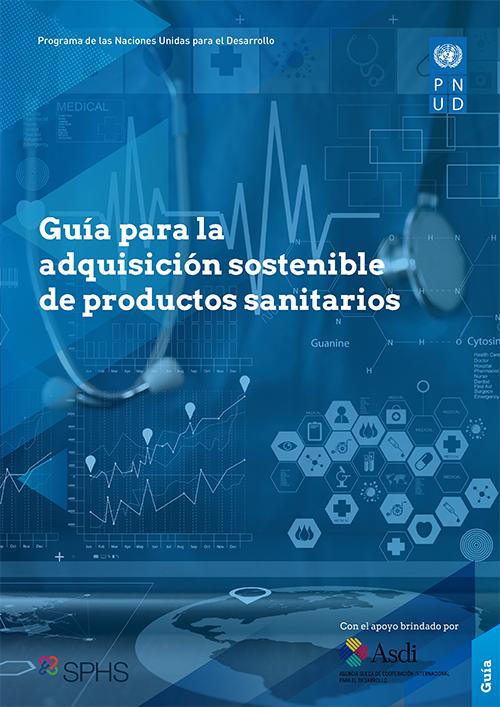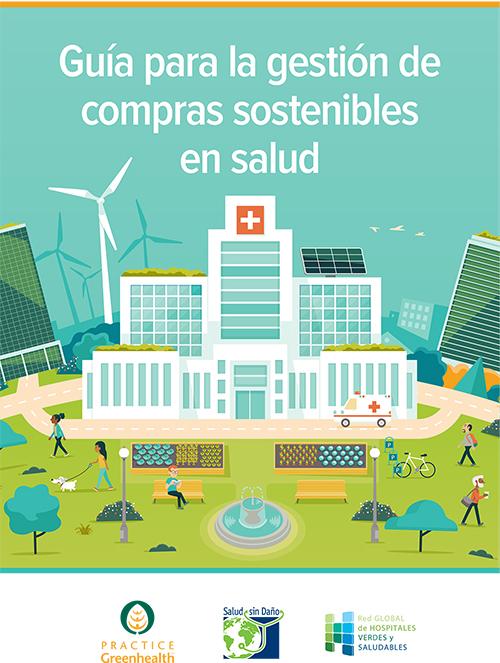The United Nations Development Programme (UNDP) and Health Care Without Harm, as a part of the Sustainable Health in Procurement Project (SHiPP), released two separate Sustainable Procurement Guides as roadmaps to build a better global health system and improve the access to quality health products.
On 29 September 2020 at 16:00 CEST, UNDP and Health Care Without Harm are organizing a joint virtual session to launch the Spanish versions of their Sustainable Procurement Guides. The session will be in Spanish.
As the world is currently facing one of the most daunting pandemics in history, procurement of medical products such as medical masks and gloves, ventilators, and respirators has increased drastically. The global health sector’s unified concern today is to prevent and provide a cure for COVID-19. Yet it is an indisputable fact that the delivery of prevention and treatment services can inadvertently contribute to major human and environmental health problems.
Every day, health care organizations make choices about the products and services they use, from medications, food, and hospital supplies, to the energy source used for lighting and powering operating rooms. The collective purchasing power of the health care organizations can shape the marketplace, increase demand for sustainable products, and embrace a broader healing mission.
The United Nations Development Programme (UNDP) and Health Care Without Harm, as a part of the Sustainable Health in Procurement Project (SHiPP), released two separate Sustainable Procurement Guides as roadmaps to build a better and resilient global health system and improve the access to quality health products.
When
September 29
- 8:00 AM Guatemala City, Guatemala.
- 9:00 AM Mexico City, Mexico | Bogotá, Colombia.
- 11:00 AM Buenos Aires, Argentina | São Paulo, Brazil | Santiago de Chile, Chile.
- 4:00 PM Central European Summer Time.
- See the event in your time zone
Speakers
Valentin Gonzalez - Deputy Resident Representative, UNDP Argentina: Valentin Gonzalez currently serves as Deputy Resident Representative in the UNDP Country Office in Argentina, previously worked as Regional Advisor in the UNDP Regional Bureau for Latin America and the Caribbean and as Management Specialist at UNCDF headquarters in New York. His main experience covers the areas of operations and program management, finance, procurement and Information Technology for Development. During the period 2000-2006 he worked in country offices as Operations and Programme Specialist in the UNDP offices in Cuba and Poland. Prior to UNDP, Valentin worked as Deputy Director of the National Health Telecommunications Network in Cuba. A Cuban national, he holds a Masters degree in Computer Science from the St. Petersburg Electrotechnical University, Russia.
Mariano De Donatis - International Managing Director, Health Care Without Harm: With over twelve years of experience working with civil society networks and coalitions to influence change at the national and global level, Mariano brings a tremendous amount of experience to help build and strengthen collaboration, management and governance for Health Care Without Harm. Prior to joining Health Care Without Harm, Mariano worked as Oxfam's Global Programme Manager, leading its advocacy work in BRICSAMIT countries - Brazil, Russia, India, Indonesia, China, South Africa, Mexico and Turkey. He led multi-issues campaigns, managed a flagship program to empower civil society networks and supported the Oxfam confederation's development in the Global South.
José Manuel Irizar - Programme Associate, UNDP Argentina: José Manuel Irizar is an Argentine sociologist with post-graduate studies in public administration and social policies. He has worked for more than 10 years in different organisations of the public sector in Argentina. He has been working for the UNDP Country Office of Argentina, as Programme Associate in the Social Development cluster since 2003. He has experience in policy and project implementation problems in federal countries.
Antonella Risso - International Climate Technical and Research Manager, Health Care Without Harm: Antonella leads Health Care Without Harm’s work to support hospitals and health systems around the world in measuring, tracking and reducing their climate footprint. She will also support health care initiatives for climate resilience and leadership. For the past eight years, Antonella served as Technical Project Coordinator for Health Care Without Harm in Latin America, helping build the organization’s Global Green and Healthy Hospitals Network into a vibrant region-wide constellation of hospitals and health systems, while providing training, assistance and developing tracking and reporting tools for its members. She has also worked on sustainability issues with Argentina’s Ministry of Health.
Mónica Lisett Castaño Tovar - Coordinator, Environmental Management and Sanitation, Fundación Valle del Lili, Colombia: For the past 16 years Mónica has been working on the continuous improvement of the environmental management system of the Fundación. In that institution, she developed environmental programs for wastewater control, sustainable procurement and environmental education. Under her management, the institution received the National Ecology Award "Blue Planet". She is an active leader in the sustainable procurement project in LAC, especially has been a reference for the GGHH members.
Moderator
Carolina Gil Posse - Programs and Communications Coordinator for Latin America, Health Care Without Harm: Carolina leads the communications strategy for Latin America and produces all content to support it. She coordinates the Global Green and Healthy Hospitals network initiatives in the region and the training programme on sustainability, climate change and health. She also coordinates the team responsible for the delivery of the Health Care Without Harm program portfolio in Latin America. She has been working for Health Care Without Harm since 2012, based in Buenos Aires, Argentina. Carolina is a communications and journalism professional, with 18 years of experience in media and more than 10 years in the nonprofit sector.
About the UNDP Sustainable Procurement Guidance Note
Health systems generate significant environmental impacts both up and downstream. These range from service delivery, to the natural resources and products health systems procure and consume, to the waste they generate. This, in turn, contributes to climate change, chemical contamination, resource depletion, biodiversity loss, air and water pollution.
In this regard, the Sustainable Health Procurement Guidance Note has been developed at a very important time. The Guidance Note aims to improve access to quality health products through capacity building on environmental, social and ethical considerations and by using documented practices of market-shaping capabilities for transformation through decoupling activities.
One of the key concepts introduced in the guidance note is the need to decouple the health sector from economic activity, which means that there is need to deliver critical health services, grow the economy, while producing less waste, using fewer resources and reducing the negative impacts on the environment and human health. In this regard, the guidance note introduces a variety of health programme approaches, procurement strategies, case studies and best practices to build resilience through the application of different techniques to help transition the market from overconsumption, waste and ecological harm.
The UNDP Sustainable Health Procurement Guidance Note is available in both English and Spanish.
The Sustainable Procurement Guide by Health Care Without Harm, Global Green and Healthy Hospitals, and Practice Greenhealth
The COVID-19 crisis exposed the fragility and vulnerability of the global health care supply chains. It also has provided an opportunity to move toward localized supply chains that not only reduce environmental harm but also provide local business opportunities and jobs.
A groundbreaking Sustainable Procurement Guide, by Health Care Without Harm, Global Green and Healthy Hospitals, and Practice Greenhealth, featuring stories from 25 health care organizations across the globe, offers a roadmap to develop a sustainable purchasing strategy that prioritizes community and environmental health and safety while reducing costs.
The Guide serves as a roadmap for both new and existing programs and is focused on 10 elements – from developing an action plan and high-impact procurement opportunities to tracking and reporting results – that make up a systematic approach to operationalizing sustainable procurement. Highlights from 25 health systems from around the world illustrate the implementation of the elements.
Organizations will learn best practices to improve financial performance and how best to engage internal stakeholders and suppliers. It details the business case for buying sustainable goods and services and how sustainable procurement can strengthen and align with other organizational goals.
The guide uses a “plan-do-check-act” cycle as a framework for developing and implementing a successful sustainable procurement program, which is a quality process improvement method commonly used in health care. It can help organizations build and assess elements of their programme one step at a time while adapting to new experiences and lessons learned.
By using this guide, organizations are well on their way to integrating industry-leading sustainable procurement practices that will save your facility money, maximize the efficiency of operations, and distinguish organizations as a leader in the field.
The Sustainable Procurement Guide is available in English and Spanish, and will be soon launched in Chinese and Portuguese.
The Sustainable Health in Procurement Project (SHiPP), jointly implemented by UNDP and Health Care Without Harm and funded by the Government of Sweden through Swedish International Development Cooperation Agency (Sida), enabled the development of the Sustainable Procurement Guides.

